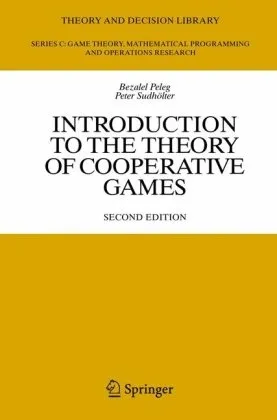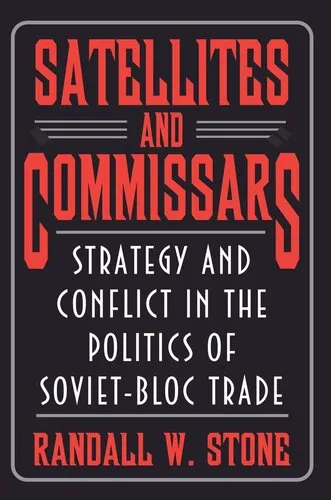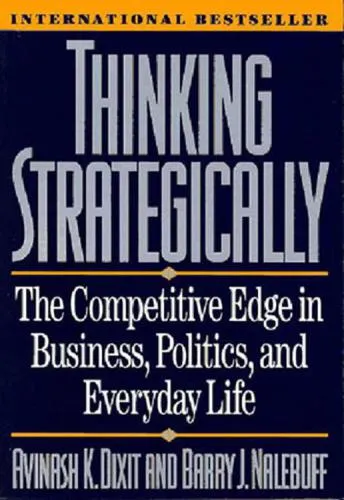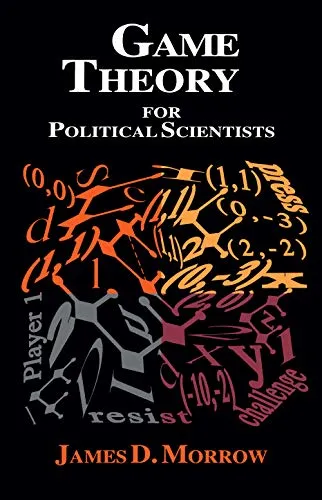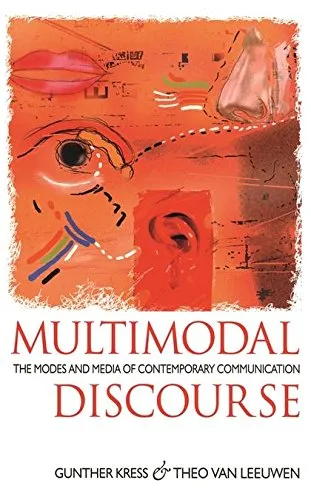Introduction to the Theory of Cooperative Games
4.0
بر اساس نظر کاربران

شما میتونید سوالاتتون در باره کتاب رو از هوش مصنوعیش بعد از ورود بپرسید
هر دانلود یا پرسش از هوش مصنوعی 2 امتیاز لازم دارد، برای بدست آوردن امتیاز رایگان، به صفحه ی راهنمای امتیازات سر بزنید و یک سری کار ارزشمند انجام بدینکتاب های مرتبط:
معرفی کتاب: Introduction to the Theory of Cooperative Games
کتاب Introduction to the Theory of Cooperative Games یکی از مهمترین و جامعترین منابع در زمینه نظریه بازیهای مشارکتی است. نویسندگان این اثر، Bezalel Peleg و Peter Sudhölter، با ترکیب عمیقی از تخصص در ریاضیات و اقتصاد، خواننده را در مسیر درک مفاهیم پیچیده و پیشنهادات علمی مرتبط با نظریه بازیهای مشارکتی هدایت میکنند. این کتاب نقش کلیدیای در پرورش ایدهها و کاربردهای این دانش در حوزههای مختلف دارد.
خلاصهای از کتاب
این کتاب بهعنوان یک مرجع پایهای در نظریه بازیها، به بررسی مفهوم بازیهای مشارکتی (Cooperative Games) و نحوه تعامل عوامل مختلف در چارچوب مشخص پرداخته است. نویسندگان با تکیه بر مفاهیمی نظیر Core، Shapley value، Bargaining sets و مفاهیم دیگر از جمله Nucleolus و Egalitarian value، شیوه مناسبی برای مدیریت و ارزیابی نتایج مختلف در میان اعضای یک گروه ارائه میدهند.
این اثر شامل بخشهای مختلفی است که از معرفی مفاهیم پایه تا تحلیل قویتر مدلها و روشهای اثباتی پیچیده پیش میرود. همچنین جنبههای ریاضیاتی دقیق آن به گونهای طراحی شده که دانشجویان و پژوهشگران در هر سطحی بتوانند از آن بهره بگیرند.
نکات کلیدی
- توضیح دقیق مفاهیم Core و Shapley Value به همراه کاربردهای آنها در بازیهای مشارکتی
- استفاده از روشهای شناختهشده ریاضیاتی برای تحلیل مسائل واقعگرایانه
- بهکارگیری الگوریتمها و روشهای عددی جهت حل مسائل پیچیده
- توجه ویژه به متغیرهای اجتماعی، اقتصادی، و نظری در طرح موضوعات مختلف
- تصویرسازی و تفسیر مکانیزمهای مختلف توزیع در گروهها
نقلقولهای برجسته از کتاب
"Cooperative game theory is not just about fairness; it is about the mathematics behind fairness."
"Understanding the Core of a game is crucial for analyzing stability in cooperation."
"Shapley value goes beyond simple calculations; it embodies a philosophy of equity."
چرا این کتاب مهم است؟
این کتاب نه تنها بهعنوان یک منبع آموزشی ارزشمند در نظریه بازیها شناخته میشود، بلکه از نظر کاربردهای عملی نیز اهمیت دارد. مدلهای ارائه شده در این کتاب در حوزههای اقتصادی، اجتماعی و سیاسی قابل استفاده هستند و به تصمیمگیرندگان کمک میکنند تا بهترین راهحلهای ممکن را در سناریوهای رقابتی و مشارکتی بیابند.
همچنین، نویسندگان با توضیح مشروح و کامل تمامی مفاهیم و ترکیب آنها با مثالهای واقعی، محتوایی منحصربهفرد ارائه دادهاند که درک موضوعات را برای خوانندگان سادهتر میکند. این کتاب به دانشجویان، اساتید و پژوهشگران کمک میکند تا با رویکردی منظم و ساختارمند به حل مسائل و تحلیل نتایج بپردازند.
در نهایت، با تمرکز بر جنبههای مختلف بازیهای همکارانه و ارائه متدولوژیهای جدید، این کتاب هم به نظریه و هم به عمل کمک شایانی کرده است و همیشه یکی از منابع اصلی برای علاقهمندان باقی خواهد ماند.
Introduction to 'Introduction to the Theory of Cooperative Games'
The book Introduction to the Theory of Cooperative Games, authored by Bezalel Peleg and Peter Sudhölter, is a cornerstone in the study of game theory, specifically focusing on cooperative games. It presents a mathematically rigorous yet accessible treatment of the subject, offering readers an in-depth exploration of foundational concepts and advanced topics. With precise formalism, clear examples, and an emphasis on applications, this book is an essential resource for students and researchers intrigued by the dynamics of collaboration and decision-making in multi-agent systems.
Cooperative game theory studies how groups, or coalitions of individuals, can work together to achieve mutually beneficial outcomes. Unlike non-cooperative games, where players act independently, cooperative games emphasize joint strategies and equitable distribution of gains. The book introduces these ideas from first principles and progressively builds a robust framework for analyzing such games with mathematical rigor.
Detailed Summary of the Book
The book delves into the essential aspects of cooperative game theory, starting with foundational definitions and progressing toward advanced topics. It begins by defining cooperative games and the key concept of the characteristic function, which maps coalitions to their worth. This is followed by discussions on important solution concepts such as the core, the Shapley value, and the nucleolus.
Readers are introduced to the mathematical properties and the implications of these concepts. The authors present the axiomatic foundations and justify their relevance using intuitive examples. For instance, the Shapley value is explored as a unique, fair distribution of payoffs satisfying symmetry, additivity, and efficiency—a cornerstone principle in cooperative games.
The middle chapters feature topics like games with transferable utility (TU games), stability criteria for coalitional agreements, and bargaining sets. Special emphasis is placed on the core—the set of undominated allocations—and its properties across various classes of games. Theoretical discussions in these sections are enriched by geometric interpretations and diagrams where optimal coalition structures come alive.
Finally, the book examines linear programming approaches to cooperative games, extending the concepts of duality and optimization to gain further insights. It provides a comprehensive treatment of convex games, potential games, and other advanced themes, making it an indispensable reference for readers aiming to grasp the intricate foundations of cooperative strategies.
Key Takeaways
- Understanding the foundations of cooperative game theory, including transferable utility (TU) and non-transferable utility (NTU) games.
- A rigorous explanation of key solution concepts such as the core, the Shapley value, and the nucleolus, supported by axiomatic characterizations.
- Insights into stability and fairness in coalitions and practical applications of cooperative theories to real-world scenarios.
- Advanced mathematical tools like linear programming and convex analysis applied to cooperative games.
- An analytical framework that bridges the gap between formalism and intuition, making the subject accessible yet deep.
Overall, the book equips readers with not only theoretical knowledge but also practical tools to solve cooperative game-theoretic problems across disciplines such as economics, political science, and operations research.
Famous Quotes from the Book
"The challenge of studying cooperative games is to find a balance between fairness and rationality in the distribution of gains."
"In cooperative games, it is not merely the strategy but the capacity to form coalitions and negotiate payoffs that defines success."
"The Shapley value is not simply an allocation method; it is a measure of the contribution of each participant, defined by principles of fairness."
Why This Book Matters
Introduction to the Theory of Cooperative Games holds a unique place in the literature of game theory for its comprehensive scope, clarity, and emphasis on both foundational concepts and advanced applications. The mathematical rigor combined with real-world applicability makes it an invaluable resource for students, researchers, and practitioners alike.
Cooperative game theory is not merely an abstract mathematical discipline; rather, it underpins the study of cooperation and collaboration across diverse fields. This book reveals the inner mechanisms driving collective decision-making, enabling us to analyze problems as diverse as political coalitions, supply chain partnerships, and joint ventures in corporate strategy.
Beyond its academic impact, the book cultivates a deeper understanding of fairness, stability, and negotiation—concepts that resonate in personal and professional contexts. Its exposition of cooperative games bridges the gap between theory and application, enabling readers to approach real-world problems armed with powerful analytical tools.
Whether you're a student of economics, a researcher in game theory, or a professional in a collaborative industry, this book will transform the way you understand the dynamics of cooperation.
دانلود رایگان مستقیم
شما میتونید سوالاتتون در باره کتاب رو از هوش مصنوعیش بعد از ورود بپرسید
دسترسی به کتابها از طریق پلتفرمهای قانونی و کتابخانههای عمومی نه تنها از حقوق نویسندگان و ناشران حمایت میکند، بلکه به پایداری فرهنگ کتابخوانی نیز کمک میرساند. پیش از دانلود، لحظهای به بررسی این گزینهها فکر کنید.
این کتاب رو در پلتفرم های دیگه ببینید
WorldCat به شما کمک میکنه تا کتاب ها رو در کتابخانه های سراسر دنیا پیدا کنید
امتیازها، نظرات تخصصی و صحبت ها درباره کتاب را در Goodreads ببینید
کتابهای کمیاب یا دست دوم را در AbeBooks پیدا کنید و بخرید
1482
بازدید4.0
امتیاز0
نظر98%
رضایتنظرات:
4.0
بر اساس 0 نظر کاربران
Questions & Answers
Ask questions about this book or help others by answering
No questions yet. Be the first to ask!
